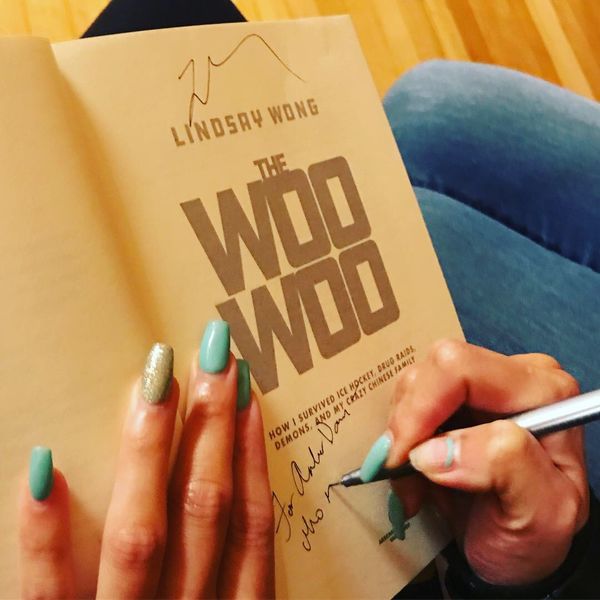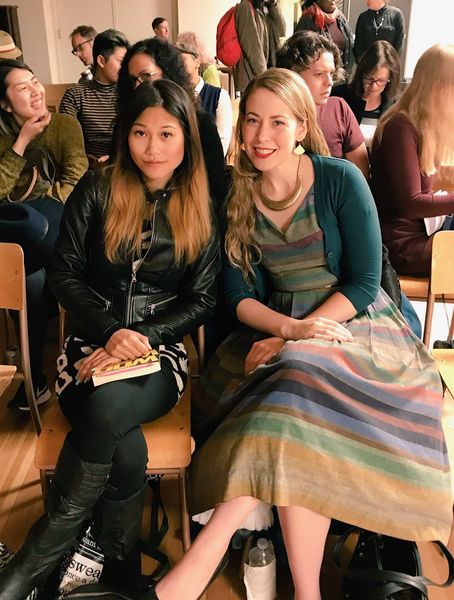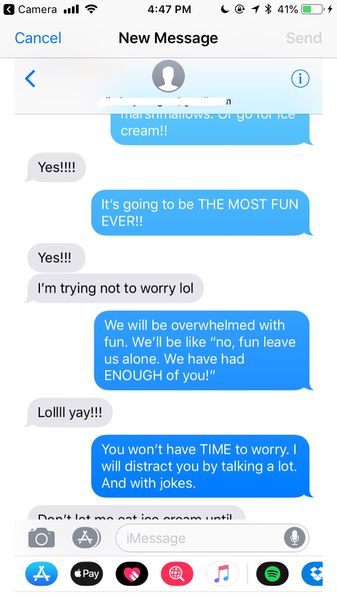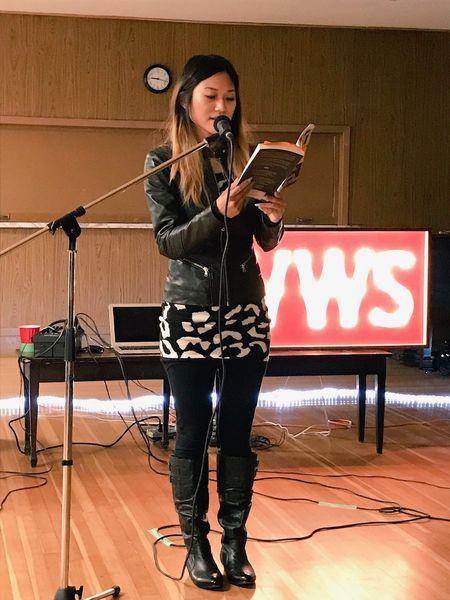A Tribute to Literary Friendships
By A.H. Reaume
“Are you a writer?” I asked the girl standing on the other side of the table.
I was manning a booth for a writing program at an outdoor literary festival. It was cold and attendance was down. Most of the people who stopped by did so because I had ‘fun-sized’ chocolate bars on offer. I was trying to figure out if this girl had her eye on the Coffee Crisps or the program pamphlets.
“Yes,” she said and smiled. “I just recently moved home after finishing my MFA.”
“What kind of stuff do you write?” I asked.
“I’m finishing a memoir about my crazy Chinese family,” she said. “A bit like Augusten Burroughs’ Running with Scissors - only with more swear words.”
I could tell you more about what was said in this conversation, but all you need to know is that she had me at ‘more swear words.’ I immediately wanted to be Lindsay Wong’s best friend and learn more about her writing. At the time, I was desperate for writer friends. I had none.
It was just my luck that Lindsay was also in the market for literary friends. Having just moved back home, she was stuck in the wasteland of Coquitlam that she describes in her memoir The Woo Woo: How I Survived Ice Hockey, Drug Raids, Demons, and My Crazy Chinese Family, as Pot-Mountain--because of the density of grow-ops on the plateau.
“I go to the coffee shop to write but it’s all just stay-at-home moms in Lululemon arguing with the baristas over whether there’s enough foam in their cappuccinos,” she said.
We hatched a plan right there. We would write together.
And every Saturday, we did. We met halfway between our homes – both of us driving or busing over an hour to a coffee shop on Commercial Drive to spend a few hours together each week. We made jokes. We talked about our writing fears. Lindsay e-mailed agents. I wrote chapters of my book. Sometimes we looked over each other’s work and gave feedback. Sometimes we spent the day making plans for road trips or other adventures and then felt guilty that we had wasted our writing time.
Your CanLit News
Subscribe to Open Book’s newsletter to get local book events, literary content, writing tips, and more in your inbox
Those hours were a chance for Lindsay to get away from her mom--who would often interrupt her writing and force her to go to Costco with her. It was also a chance for me to get some time away from my partner Gio who was struggling with severe depression and who had been suicidal for the last two years. For the few hours that I was with Lindsay, I could pretend like I was a normal 30-year-old and not a caregiver for someone with severe mental health issues. That I was a writer and not someone who lived in a permanent state of fear.
I didn’t share the details of my personal life with Lindsay initially, but she could tell something was off. She would ask me if I was okay whenever I read a text message from Gio.
“I’m fine,” I would tell her and smile shakily. I had realized long ago that people quickly tired of hearing about mental health issues that didn’t immediately go away. I didn’t want to wreck this friendship too by burdening it with the weight of Gio’s struggles.
I wanted to keep my Saturdays fun.
But one Saturday, I couldn’t pretend anymore. I had just arrived at the coffee shop when I got an emergency text from Gio. I needed to go home right away.
“I’m so sorry,” I said to Lindsay, as I gathered my things. I was embarrassed. I kept telling her how terrible I felt that she had come all the way to Vancouver.
“There’s nothing to apologize for,” she said. “I’m so sorry that you’re going through this.”
Of all the people that I had in my life during the years Gio was struggling with mental illness, Lindsay was the most understanding. She always asked me how things were going at home and truly wanted to hear the answer—even if it was complicated or bleak. She listened without judgement. She never gave intrusive advice. She was someone I could talk to about the very difficult things I was going through. I hadn’t had that in a long time. I didn’t realize how much I’d missed it.
But Lindsay also let me have fun. When I was done talking about the hard things that happened that week, we went back to our usual Saturday routine. We laughed. We plotted. We talked endlessly about the day when we would both publish our books. We encouraged each other whenever fears that that day would never come took over.
When Gio got better and we broke up, Lindsay was the first person I had over to christen my new apartment. We sat on my balcony, ate hummus, and talked about writing.
“I’m so glad to see you happy,” Lindsay said.
And when I got a serious head injury and couldn’t leave my house, Lindsay was there again.
“When can I come over?” she asked. “What can I bring?”
There is something special about friendships with other writers. There is a deep intimacy that is often hard to find with new friends once you’re an adult. Maybe it’s because you share so much with each other when you talk about or exchange your writing. Whether it’s fiction, poetry, or memoir, we write about the things that affect us most deeply. About our obsessions, our histories, our desires, our fears. Sometimes another writer is the first person we share our work with.
And that sharing is a moment of incredible vulnerability. We are putting something that we have worked on and thought over for months or years into another’s hands and asking – what do you think about this? Is it any good? How can I make it better?
There are few more intimate acts.
But whether I’m showing a friend an intensely personal piece I’ve written or just talking to them over coffee, I have found that my writer friends often show me greater empathy and care than other friends. Perhaps that’s partly because of what often attracts people to writing—a heightened sensitivity, a need to think deeply through ideas and concepts, a desire to inhabit the subjectivity of different characters. It is my writer friends that I turn to when I need to talk through something stressful that’s happening in my life. It is also my writer friends I go to when I want to share my happiest news --because I know they’ll be right there with me celebrating.
Not all writers are like this, of course. I have also been disappointed by failures in empathy and allyship by many writers I’ve been friends with, but I have been lucky to see amazing acts of community and solidarity in the face of struggle, discrimination and harassment. I have also found a group of amazing writer friends who are my biggest cheerleaders. These include emerging writers like Yilin Wang, Meghan Black, and Isabella Wang who like to introduce me to others by emphatically saying in chorus (and making me blush deeply), “Amanda is such an amazing writer!”
There is also a deep sense of camaraderie that comes from going to readings and seeing many of the same faces. From picking up conversations that you were having the last time you met and following up on other people’s works-in-progress. From commiserating about the very long process of writing and the complex process of publishing. About the blocks that we hit in our writing, and about the difficulties of finding time to write.
Twitter has also greatly opened up the scope of my writerly friendships since I joined it in early 2018. I have eaten moon cakes with writers visiting Vancouver who I met on the site. Had long-distance book club chats with writers as far away as Ottawa, Montreal, and New York. Plotted ways to make CanLit better for marginalized writers over DM or e-mail. Hosted writers on my futon when they came to Vancouver. Ran in to Twitter friends at readings and gushed about how much we’ve enjoyed reading each other’s tweets.
These relationships nourish and sustain me. These conversations have sparked ideas and made me think more deeply about the art of writing, the writing community, and my own work. I come away feeling richer. Better understood. Full. And often filled too with a passion to change things in CanLit for the better.
These conversations follow me as I go back to my writing. They help me to recontextualize my thoughts, sharpen my focus, evolve as a writer--and also feel less alone.
Writing is often very lonely work. We read alone. We think through the ideas that make up the backbone of our work alone. We write alone. We even worry about our writing alone. Writer friends don’t change that, but they allow moments of connection within that solitude. They tell us that the project that we’re working on matters or they encourage us to take an artistic risk or they say something that helps us get over a block. Sometimes their work is what speaks to us. Sometimes they inspire us to respond back. Sometimes there is a dynamic conversation between writers on the page.
These days, I feel a deep sense of community with many writers in Vancouver. We care for each other. We make sure to text each other daily when we’re going through difficult times. We carpool to events together and laugh sometimes on the way there until we can barely breathe. We buy each other’s books, read at each other’s book launches, and cheer at each other’s readings.
I have taught three different writers how to make jam in my kitchen—my lessons punctuated with conversations about life and disability and writing and books. Sometimes we feed each other. With Lindsay, that means that I carefully go over all of her many allergies before deciding on the menu.
“Your house is the only place outside of a restaurant I feel safe eating,” she told me once. I always have chili in my freezer for her – with chickpeas because she can’t eat kidney or black beans. And every time Lindsay goes on a writing residency, she brings me back a gift--tea from England, key lime jam from the Florida Keys.
With other friends, the way we care for each other looks different. Sometimes it’s a book brought back from a trip abroad as thanks for my help finding them a lawyer when they were threatened with a lawsuit.[1] Sometimes it’s a meal another writer cooks for me in recognition of the care package I made to help them through exam season.
I like best to throw parties at my home. To invite all sorts of writers over and then just sit back and listen to the conversation. Or make jokes whose punchlines only fellow writers will understand. There is such poetry in a life filled with so many of these warm connections with other writers. And there is so much laughter.
When I met Lindsay, I had zero writer friends. Now I have more than I can count. But Lindsay is still my closest literary friend. When I found out her book was shortlisted for the Writer’s Trust Hillary Weston Prize, I texted her immediately.
“Can I come to Toronto with you?” I asked. “I want to be with you at the awards ceremony.”
“UM YES!!!!!” she texted back.
Within 30 minutes, we had confirmed with Writer’s Trust that I could get a ticket and I’d gotten approval to take the time off work from my boss.
That morning we started planning our flights, accommodations, and the fun things we would do together on the trip. The places we would need to stop at for ice cream (Lindsay’s favourite). What we would wear to the ceremony. Strategies for calming Lindsay’s nerves.
And it felt exactly like it did when we had sat in that coffee shop all those Saturdays ago and planned out road trips and dreamed about our writing careers.
That’s the thing about having writer friends. You have someone next to you on the journey. People there for you during the highs and the lows. People who can understand just what those peaks and valleys feel like and what to say when they come.
“I’m so excited for our trip,” I told Lindsay the other night after watching her read from her book for the first time.
“Me too,” she said. “But I won’t truly be happy until I see your book out. That’s what we always dreamed about. It’s your turn next -- and I’ll be there for you when it happens.”
---
[1] An all too common reality in CanLit these days.
The views expressed by Open Book columnists are those held by the authors and do not necessarily reflect the views of Open Book.
A.H. Reaume is a Vancouver-based fiction writer who reads too much and is currently in too many book clubs (four in total). Reaume has a background in feminist activism and an M.A. in Canadian Literature from UBC. She's been published in the Vancouver Sun, The Globe and Mail, USAToday.com, and Time.com and is currently trying to finish her first novel.







